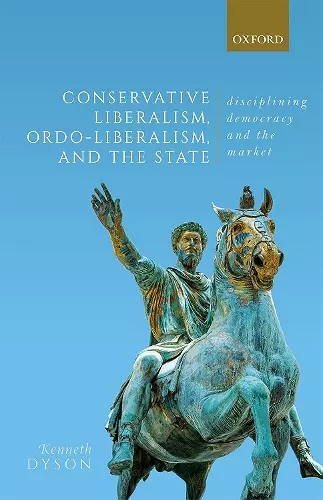Conservative Liberalism, Ordo-liberalism, and the State
Disciplining Democracy and the Market
Format:Hardback
Publisher:Oxford University Press
Published:26th Jan '21
Currently unavailable, and unfortunately no date known when it will be back

This book uses extensive original archival and elite interview research to examine the attempt to rejuvenate liberalism as a means of disciplining democracy and the market through a new rule-based economic and political order. This rebirth took the form of conservative liberalism and, in its most developed form, Ordo-liberalism. It occurred against the historical background of the great transformational crisis of liberalism in the first part of the twentieth century. Conservative liberalism evolved as a cross-national phenomenon. It included such eminent and cultured liberal economists as James Buchanan, Frank Knight, Henry Simons, Ralph Hawtrey, Jacques Rueff, Luigi Einaudi, Walter Eucken, Friedrich Hayek, Alfred Müller-Armack, Wilhelm Röpke, Alexander Rüstow, and Paul van Zeeland, as well as leading lawyers like Louis Brandeis, Franz Böhm, and Maurice Hauriou. Conservative liberals also played a formative role in establishing new international networks, notably the Mont Pèlerin Society. The book investigates the rich intellectual inheritance of this variant of new liberalism from aristocratic liberalism, ethical philosophy, and religious thought. It also locates the social basis of conservative liberalism and Ordo-liberalism in the cultivated bourgeois intelligentsia. The book goes on to examine the attempts to embed this new disciplinary form of liberalism in Britain, France, Germany, Italy, and the United States, and to consider the determinants of its varying significance across space and over time. It concludes by assessing the historical significance and contemporary relevance of conservative liberalism and Ordo-liberalism as liberalism confronts a new transformational crisis at the beginning of the new millennium. Is their promise of disciplining democracy and the market a hollow one?
... the final part of Dyson's book explores the conditions of its success or failure as an economic doctrine and as a policy practice in comparative perspective. This transnational investigation, based on rich sources, is in itself a great strength of the book. * Hugo Canihac, Oeconomia *
This book provides a great contribution to the literature concerning the economic thought and policy of the centre-right political tradition that refers to conservative social philosophy and liberal economics. * Luca Sandonà, History of Economic Thought and Policy *
Kenneth Dyson has written a superb book: rich in its historical detail, clear in its analysis, and original in its main thesis. It is also wonderfully ambitious. * Molte Dold and Tim Krieger, Annals of the Fondazione Luigi Einaudi *
an academic masterpiece * Ivo Maes, Journal of European Integration History *
This new book has a much broader ambition, which will appeal to political scientists and to historians of political and economic thought alike: it intends to provide not only a thorough and contextualized intellectual history of ordoliberal ideas, but also an investigation of their transformation and political uses upto now... It is not the least of its merits that it could be fruitfully read by historians of (neo)liberalism, as well as specialists of EU, or of German politics. * Hugo Canihac, History of Political Thought *
It will be useful for those, in particular, among historians of economic thought who are interested in the twentieth century. The book will also delight those who are interested in understanding liberalism and neo-liberalism. They will in particular realise that liberalism is not, or should not be, restricted to economics. * Marie Daou & Alain Marciano, The European Journal of the History of EconomicThought *
ISBN: 9780198854289
Dimensions: 241mm x 166mm x 36mm
Weight: 1002g
584 pages